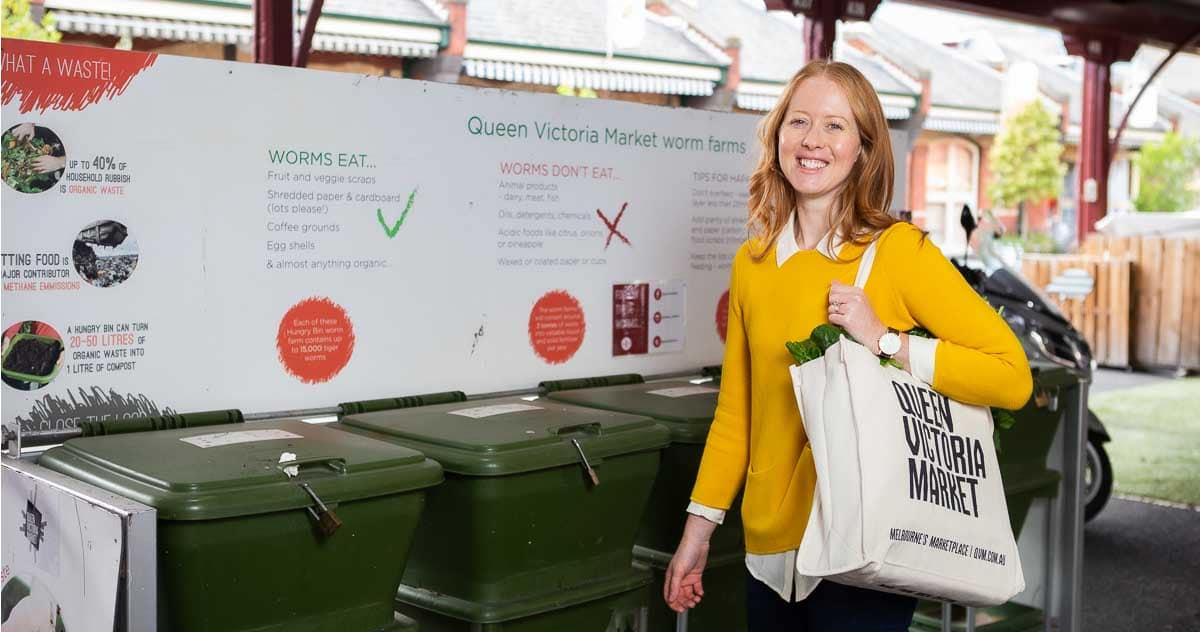Five eco-friendly new year resolutions

The new year has arrived and with it the resolutions we make for the year ahead. If you haven’t made any plans yet I have five eco-friendly new year resolutions that are good for us and the planet.
My advice for making any changes is to do it slowly. Pick one habit then build on it. You won’t save the planet on your own. But if each of us did just one thing it would help shift the change we need. Luckily these days making an eco habit change is more common and definitely not considered hippie (not that there is anything wrong with that!). If you need some help to keep you on track let a friend know about your resolutions – you just might inspire them to join you.
Public transport pledge
Last year my family made the pledge to drive our car less and use more public transport. It was this decision that led to us shopping full time at Queen Victoria Market because we could get the tram there while shopping zero-waste and plastic free with ease.
Making a pledge to leave the car at home offers benefits beyond the environment. Private transport like cars create a significance contribution to carbon emissions and cutting back will help reduce greenhouse gases. Choosing the tram, bus or train, encourages more exercise and promotes local city tourism that results in supporting smaller businesses that are often missed when driving.
Public transport and walking provide an opportunity to relax, read a book or some enjoy music making it less stressful than driving. Commuters can also get more active movement in their day by walking to and from transit stops. Queen Victoria Market is well connected with bike parking and is easily accessible by tram and train.
Compost your scraps
Queen Victoria Market made the pledge to compost food scraps turning them into a valuable resource used by Victorian farmers. Sending food scraps to landfill means valuable nutrients are lost in landfill so, if you have space, why not follow the Market’s lead and start composting.
Traditionally food would decompose in nature keeping soils healthy and thriving. Since this doesn’t happen anymore it’s up to us to do our bit. In return composting will help save money as compost can replace store bought fertilisers. 35% of the average Victorian rubbish bin is food scraps. Taking these out will reduce your contribution to landfill signicicantly plus you won’t need to take the bin as much.
There are many different options to compost at home including: compost bins, worm farms like the ones the Market use, Composta garden/compost systems, Bokashi bins are great for apartment dwellers, or the popular sharewaste.com program. Check with your local Council to see if they accept food scraps in the green organics bin collection.
Eco-friendly and sustainable clothes
Clothing is a fun way to reflect our personality but most of the larger brands are contributing to the problems of fast fashion. This year make the pledge to choose brands and businesses championing eco-friendly, sustainable and ethical practices. These type of fashion brands are part of the slow fashion movement where the environment and garment workers are put first. Market traders like Collective Closets and Wendy Voon are leading Melbourne brands with ethical and sustainable practices at the heart of what they do. Eco-friendly brands offer smaller runs to reduce waste; opt for natural, recycled and reclaimed materials; and they’re made locally and designed to last.
Swap single-use for reusables
Taking reusables is a more environmentally friendly option compared to single-use plastic. Apart from reducing plastic litter, reusables help to decrease emissions associated with manufacturing and transporting items like single-use coffee cups, produce bags, takeaway containers and cutlery.
These items can also cost small businesses between $5,000-$10,000 dollars a year. If you already take your own bags to the shops, take the next step and bring along a reusable cup for hot drinks. Swap out plastic produce bags for ones made of reusable cloth. Chat with your local deli, butcher, fishmongers and even bakery about using your clean containers. Pledging to bring reusables is a great way to fight the war on waste.
Choose locally grown food
If you watched the Fight for Planet A series this year you would have learned Australians are the highest emitters of carbon per capita. Much of this is due to emissions. Choosing locally grown food can help reduce our carbon footprint since the food will have less distance to travel. Fresh food flown in on planes from overseas has a huge impact on the environment compared to produce from regional areas in Australia. Ask your local trader what foods are in season and where your food is coming from. Supporting the local food industry after a tough year for our regional areas is a pledge all Australians should get behind.
For more information about Queen Vic Market and how to get here, please head to our Visit Us page.

